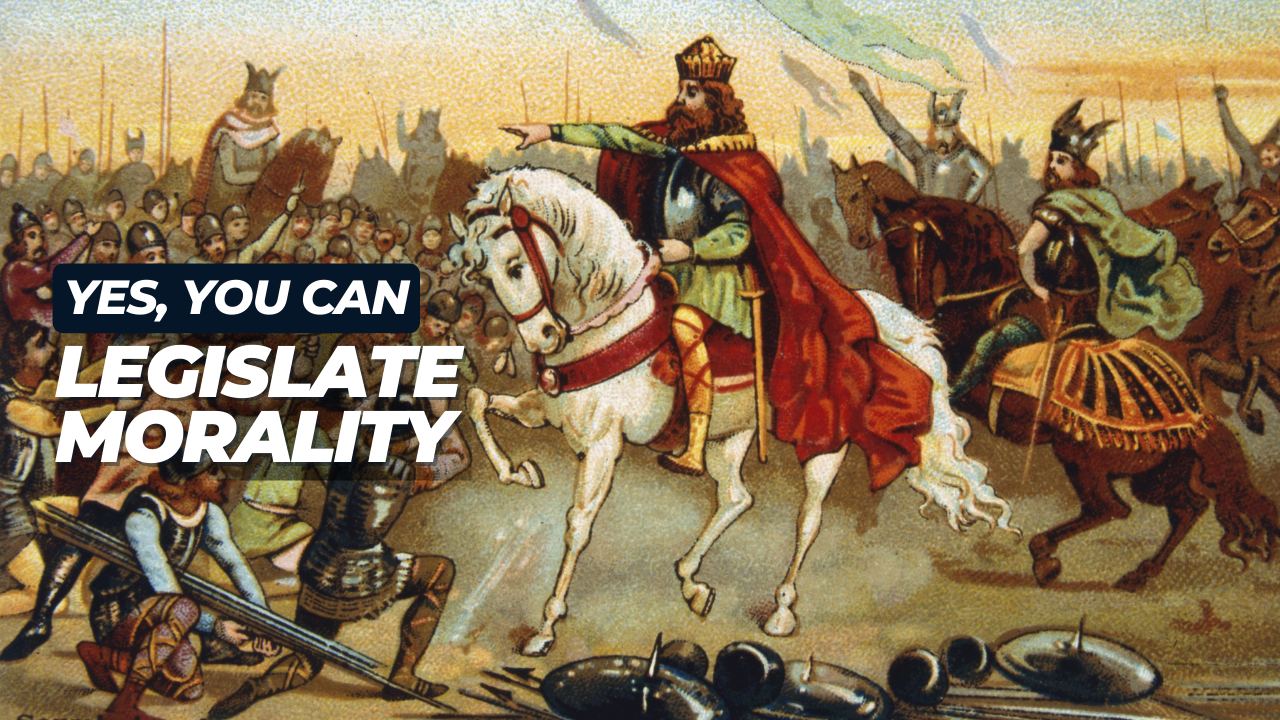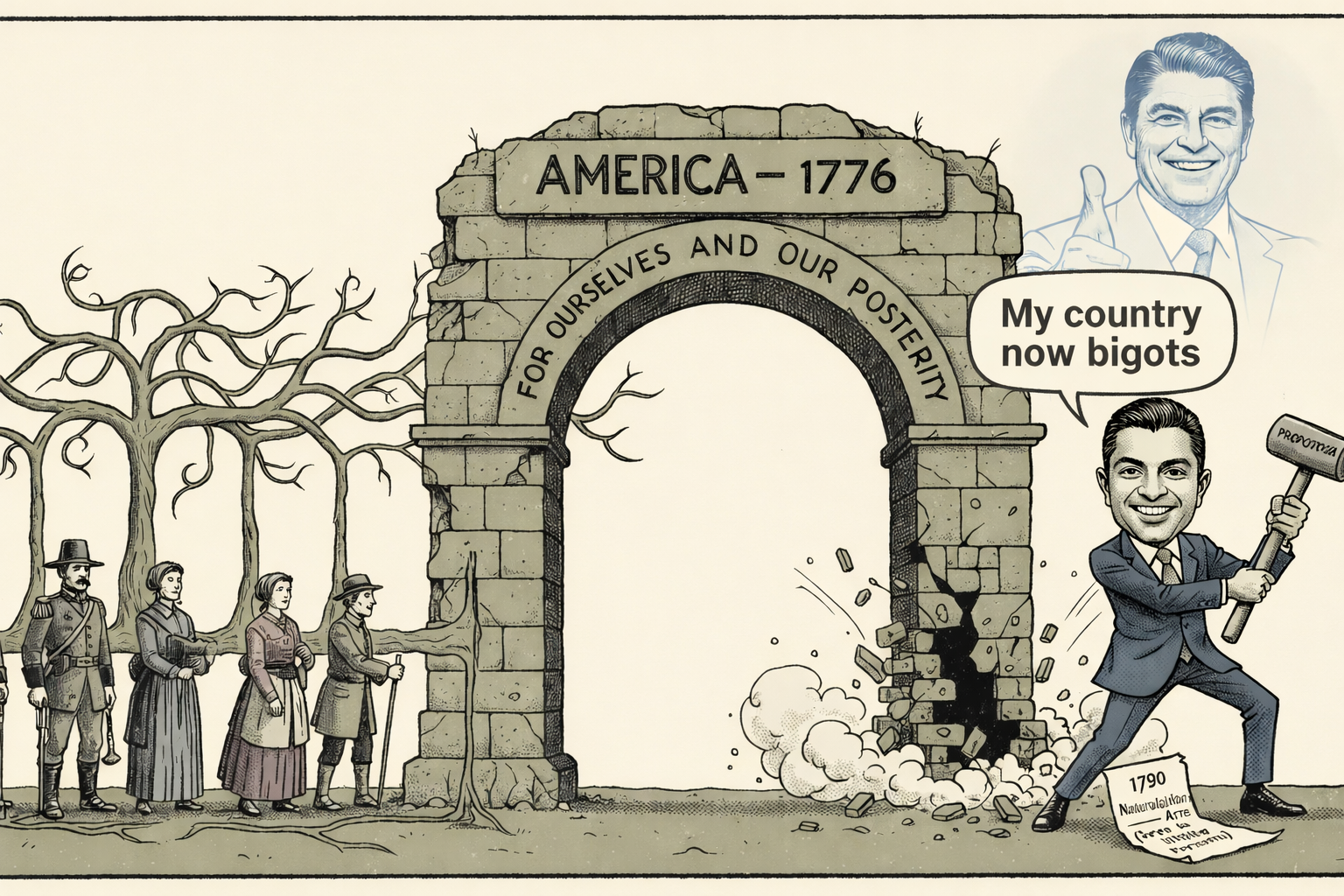Any time a conservative Christian proposes laws to address issues of public morality, he is always told “you can’t legislate morality.” This is a mantra that is deep in the bones of liberal, democratic society. You hear it all the time.
Want to pass laws to stop abortion? “You can’t legislate morality.”
Want to eliminate gay marriage? “You can’t legislate morality.”
Want to stop children being castrated? “You can’t legislate morality.”
Want to stop the dissemination of pornography? “You can’t legislate morality.”
But simply repeating something ad nauseam doesn’t make it true.
The reality is that law really does “legislate morality.”
The very idea that morality is separable from external society—from the norms and standards of everyone else around you—betrays a liberal individualism that is completely out of touch with reality. Human beings do not develop their moral bearings in isolation. Only the most antisocial personalities and the mentally ill are capable of bootstrapping a novel and idiosyncratic morality apart from what everyone around them believes. The overwhelming majority of people acquire their moral senses from those around them, especially those in authority over them. Parents, teachers, peers, media, and yes, even government instill moral principles upon them. The Bible commands Christian parents to do this very thing (Pr. 22:6, Eph. 6:4). Naturally, it isn’t as simple as giving a child a set of rules and downloading them into their brain. The human heart does not work this way. However, the moral training parents give their children does become internalized over time. Children really do believe what their parents tell them is right and wrong, and though some can and do rebel against it, the majority will more or less follow what they have been taught. Outward conformity to external rules usually becomes internalized over time.
Rules don’t change a person’s heart directly and on their own, but they absolutely do train you before you are even able to understand why those rules are given. When I tell my young child not to touch the hot stove, he doesn’t understand the reason why he has been given this command. All he knows is that his father told him something and he must obey. Only when he matures will he understand the reason he was given this command is because I love him and do not want him to harm himself. That is how the exercise of authority brings about moral formation. Whether that authority is father over son or king over subject is immaterial.
You can see this demonstrated in political and cultural developments over the last century. Attitudes regarding race relations have changed dramatically since the Second World War. During the war, the overwhelming majority of soldiers were in favor of maintaining the military policy of segregating units by race. When the United State Supreme Court declared school segregation unconstitutional in 1954, over 40% of Americans disagreed with the decision. Forty years later, in 1994, the same poll was conducted and only 11% disapproved of the ruling while 87% approved. No recent polling exists on the decision, but it would be safe to estimate opposition to Brown is in the very low single digits. How did Americans go from believing segregation was good to nearly everyone believing it was bad in the space of half a century? While law was obviously not the only factor in cultural change, it quite evidently had a major role. Law changes the moral principles of a people. Law has a pedagogical function. The Bible even talks about the Old Covenant law in this way (Gal. 3:24-27) Furthermore, people see a preference cascade and they want to be in the majority. This doesn’t imply that they are insincere. It is simply human psychology. Human beings adapt to the their surroundings, including their moral surroundings.
The very same process played out with the acceptance of homosexuality and gay “marriage.” In the late 1990s into the early 2000s, defense of marriage acts and gay “marriage” bans were extremely popular even winning majorities in places like California in 2008. That same year the then-Senator Obama campaigned for President publicly opposing gay “marriage.” Then, all-of-a-sudden, the United States Supreme Court ruled in Obergefell v. Hodges that the United States Constitution guarantees a right for homosexual men to play act as married man and wife. Immediately all the Civil Rights Act provisions became applied to homosexuals and eventually to virtually every other conceivable sexual perversion. Concurrently, public opinion of homosexuality rapidly changed. The majority that had only years earlier opposed homosexuality now approved of it. Their moral views were legislated for them. It wasn’t as though every, single American sat down to deeply meditate upon their own moral principles, sifting through complex philosophical and ethical conundrums. They saw which way the wind was blowing and conformed. Again, while some may be insincere, human beings are pack animals. We do whatever everyone else is doing. Anyone who has ever been in a traffic jam knows this is true.
So when a Christian proposes laws for the purposes of public morality, the you-can’t-legislate-morality-ers who naysay don’t truly believe what they are saying. There is always going to be a public morality enforced by law. It is not “whether,” but “which.” Our current legally enforced public morality makes “racism” and “discrimination” the most damnable offenses. The official public morality makes every sexual practice except for pederasty—for now—all but illegal to criticize. There is a public morality and the laws we have passed have enshrined it. If Christian laws were passed that make adultery a crime once again, prohibit the production and distribution of pornography, prohibit public displays of homosexuality, criminalize all abortion, and eliminate no-fault divorce, the culture would necessarily change. And such change would be rapid. And just like all other cultural change, it wouldn’t be insincere. People would conform to the influences that surround them just as they have with other cultural change.
Laws would not make men Christian. The Christian influence of a Christian culture everywhere around them would however make the preaching of the gospel significantly easier. Take for example the unfortunate Congresswoman Nancy Mace. Last week Mace spoke at a pastors’ prayer breakfast held by Senator Tim Scott where she openly bragged about cohabitating with a man not her husband and turning down intercourse with him in order to make it on time. In a society governed by Christian-influenced law, something like America a century ago, such a thing would be unheard of by anyone, much less a person with major political influence who makes much of being a regular church-goer. No one would be expected to individually exegete the Bible in order to arrive at a Christian sexual morality. It would be in the air around them and implicitly understood by everyone. You simply would not do that, just as everyone today knows there are certain words you are forbidden from uttering.
In such a world, where Christian understanding of right and wrong is fundamental to the entire society, there is a pathway where the gospel can be understood and applied. In our world today, much of what the Bible calls “sin” is celebrated as a virtue. Just to reach a point where people can admit something they do is a sin is a steep mountain to climb. Law is a teacher. What the king commands trains his people in what is moral and immoral. When the Bible describes the evil kings of Israel, it often says “who made Israel to sin.” This does not imply that the average person in Israel had no moral agency or was not responsible for what he or she did. What it does mean is that what the political leader commands has a very real effect on how his people understand right from wrong. A people will follow their leader for good or for ill. That is how God made human beings.
So with this in mind, Christians should absolutely want to pursue law for the sake of public morality. “Cultural Christianity” is good. All legislation is legislating one morality or another. God changes men’s hearts. And one instrument He uses is the commands of those He places in authority. To that end, we must pray for godly rulers who will wield the authority God gives them to reform a very corrupt and godless society. Kings have led great moral reforms in the past. And they will do so once again.
Invest and become a shareholder in Gab! Gab is currently selling shares in its business in a Regulation Crowdfunding investment round conducted pursuant to Section 4(a)(6) of the Securities Act of 1933. Click here to be directed to the crowdfunding portal to learn more about the offering.






